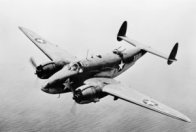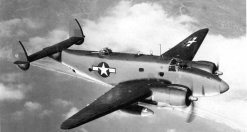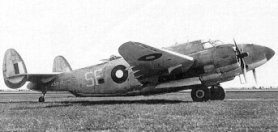
Home »
USA » Lockheed PV-1 Ventura/PV-2 Harpoon
Lockheed PV-1 Ventura/PV-2 Harpoon
Its initial sorties as a light bomber with the RAF were not a success, but in the maritime role the Ventura proved invaluable. Impressed by this performance, the US Navy adopted the type as the PV-1 for Pacific service. A major redesign to increase range and load-carrying ability resulted in the PV-2 Harpoon. After war service, surplus aircraft flew with several air forces, while others were converted to crop sprayers and executive transports.
Pleased with the Hudson, the British Air Ministry was interested in Lockheed's proposal to modify the Lodestar in a similar way, as a replacement for both the Hudson (in the maritime reconnaissance role) and the Bristol Blenheim light/medium bomber.
The Ventura, as it was to be known, was larger than the Hudson, with more powerful engines, improved armament and a greater load-carrying capability. Large numbers went to the RAF, RAAF, RNZAF and SAAF. A few were retained by the USAAF for over-water patrols as B-34 and B-37 Lexingtons.
From 1942 the US Navy took over all ASW work from the army and obtained 1600 PV-1s. The improved PV-2 Harpoon followed with major design changes to optimise it for the maritime role.
 |
 |
 |
| The RAF took delivery of 394 Ventura light bombers, which entered service in 1942. |
War surplus PV-1s and -2s were used after the war for a variety of roles. Some have been restored by warbird enthusiasts. |
This Harpoon, seen in post-war markings, has had its underdose 12.7 mm (0.50 cal) guns removed. |
|
Lockheed PV-1 Ventura/PV-2 Harpoon (Technical Specification) |
| Role |
Twin-engined maritime patrol/bomber |
| Manufacturer |
Lockheed |
| Maximum Speed |
518 kmh (312 mph) |
| Maximum Range |
2,670 km (1,650 miles) |
| Ceiling |
8,015 meters (26,300 feet) |
Weight
Empty
Maximum Takeoff |
9,161 kg (20,154 lbs)
15,422 kg (33,924 lbs) |
Dimensions
Wingspan
Length
Height
Wing Area |
19.96 meters (65 ft 6 in)
15.77 meters (51 ft 8 in)
3.63 meters (11 ft 10 in)
63.73 square meters (686 sq ft) |
| Engines |
Two Pratt & Whitney R-2800-31 Double Wasp readial engine each providing 1491-kW (2,000 hp) |
| Armament |
Two 12.7 mm (0.50 cal) machine-guns in nose and dorsal turret
Two 7.62 mm (0.30 cal) machine-guns in ventral position
Six 227 kg (500 lbs) bombs
One torpedo in bomb-bay
Two 454 kg (1,000 lbs) bombs under the wings |
Photo Gallery
Click here to submit your photo
| Have A Passion For Aircraft? |
Subscribe to our 14 series FREE newsletter
delivered weekly on World War 2 Aircraft factfile... |
| NB:- We hate spam as much as you do, so your email address will NEVER be shared with or sold to anyone else. That's a Guarantee. |
|
|






